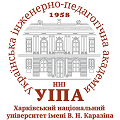In the period from 8 to 12 July, the participants of the Erasmus+ project UA-Talent-UP Vice-Rector for Scientific and Pedagogical Work, Doctor of Pedagogical Sciences Maryna Vasylieva, Professor of the Department of Information Computer Technologies and Mathematics, Doctor of Pedagogical Sciences Tetiana Bondarenko and Head of the Permanent Working Group on Internationalisation and Project Activities of UEPA, Senior Lecturer Roman Nesterenko made a working visit to the Pontifical University in Salamanca (Spain) and took part in the Global Competencies training module.
The following events were held as part of the visit.
Meeting with the Vice-Rector Dr Luis Alberto Rivas Herrero, Project Coordinator Malena Rodriguez Benito, members of the training team Maria Moliner Bernabé and Juan Manuel Castro Carracedo, and Project Manager Aneke Schroeder. The meeting included a welcome session and presentation of the Global Competencies Framework, an Ice breaker activity, and an introduction to the Pontifical University.
The second day of the visit was devoted to the development of cultural awareness competence, where university representatives visited the historic building of the Chamber of Commerce and Industry and the Center for Gastronomic Innovation, took part in the training “Bridging the Gap between Ukraine and Spain”, and got acquainted with Spanish culture. As part of this activity, the Ukrainian participants tried to explain to their Spanish colleagues with low English language skills the Ukrainian peculiarities of the Ukrainian education sector development, prepare a menu of Ukrainian dishes for a culinary festival in Spain and conduct a virtual tour of Ukraine's sights. They also visited the Faculty of Communications and discussed the development and design of the MOOC courses envisaged by the project.
The third day was dedicated to International Communication Competence and the ability to collaborate. The ICC Workshop was held: a telecollaboration exercise where project participants discussed a topic that is very important to their foreign colleagues via teleconference with representatives from Cuba, Costa Rica, and Mexico City. Representatives of Ukrainian universities tried to immerse themselves in the problem and provide their recommendations and suggestions for solving it. The trainer Juan Manuel Castro Carracedo also conducted a communication exercise with artificial intelligence. In the afternoon, a meeting was held with representatives of the Acoge NGO in Salamanca, where they spoke about the organization's work and involvement in supporting Ukrainians in Spain during the war.
The fourth day was dedicated to the development of critical thinking and problem-solving skills. Trainer Maria Moliner Bernabe conducted the trainings “Modelling Crisis Situations” and “Gamification in Evaluation and Content Creation”. Another interesting activity was a quest room in a historic building, where project participants had to use clues and encrypted riddles to find the name of a historical figure who played a very important role in the development of Spanish education, politics, and economy. Representatives of Ukrainian universities also took part in the Project Communication and Creativity Hubs Workshop.
The fifth day of the project was devoted to the development of the global competence Global Ethics and Social Responsibility and the global competence assessment. The project trainers conducted a seminar on ethics: a win-win mediation task. As part of these activities, the Ukrainian project participants got acquainted with new game and virtual techniques such as socrative, vidnoz, and created their own short media videos on various topics. They also considered the specifics of developing criteria for assessing global competencies.
The team of the Ukrainian Engineering Pedagogics Academy gained invaluable experience and practical skills in the Global Competencies module and a large number of interesting and useful materials provided by the trainers of the UA-Talent-UP project from the Pontifical University of Salamanca.
As part of the working visit, the teachers also had the opportunity to get acquainted with the sights and attractions of the city of Salamanca, the old part of which was declared a UNESCO World Heritage Site in 1988: the main square of Plaza Mayor, the complex of buildings of the University of Salamanca, the Old Cathedral (12th century), the New Cathedral, the Dominican Monastery of St. Stephen, the House of Shells, and the Romano Bridge.




